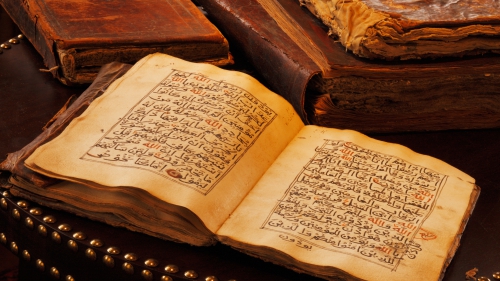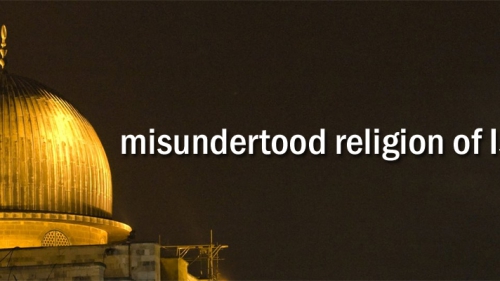The Quranic Journal

"If the Quran is eternally valid, and if it is addressing you today, then you must take every message as something which is totally and urgently relevant to your life and concerns, whether it be a value or norm, a statement or piece of knowledge, a character or dialogue, a promise or a warning, a command or a prohibition."
-from Way to the Quran by Khurram Murad, pages 43-44
Writing a journal is an exercise many of us who have gone through the North American school system may have encountered in English classes. They are a way for students to develop their writing skills.
But many self-help gurus also extol the virtues of keeping a journal as a tool for self-development. It's a way to get in touch with your feelings, a way to track your development as a person, and a way to develop a better understanding of who you are.
Amidst these uses for a journal, there is one that has been rarely talked about: the Quranic journal.
What is the Quranic journal?
The MYNA (Muslim Youth of North America) Workers Manual, published in 1992, explains what the Quranic journal is in this way:
"There are moments in life when you read some Ayahs (verses) in the Quran, and they seem to have been revealed precisely for your needs at those moments. You have read them a hundred times before, but only now have your life experiences prepared you to understand them....Keep a Quran journal of these moments when certain verses click and become real in your life."
Why keep a Quranic journal?
1. Creates reverence for the Quran
For many Muslims today, especially those who have not grown up in a Muslim country, the value of the Quran as the Word of Allah may not be as strongly entrenched.
They may not feel the very special connection to the Book of Allah other Muslims who have grown up learning and reciting it from childhood in a mostly Muslim environment have.
The Quranic journal is a way to develop a stronger connection to the Quran by noting our reactions to it.
2. It can help the words of Allah sink in
One problem many, many Muslims in our day and age, and in our culture have is a lack of concentration. In our fast-paced culture, squeezing in time to read the Quran is sometimes hard. Those times that we do read, the words don't seem to sink in. The Quran journal can help do that.
3. The Quranic journal is about you
The Quran is not simply a Book to be read and memorized. It is a Book to be lived. That means the deeper our understanding, and the more we connect what we learn from the Quran to our daily lives and experiences, the better we can see it as THE tool of guidance in our affairs.
We will see the Quran as part of our daily life in this time. The lessons in it will not be lessons for people from centuries ago, irrelevant to us. Rather, they will be our lessons, regardless of whether we live in Karachi or Kansas.
Some tips on keeping a Quranic journal
1. Ask yourself: why am I doing this?
Some reasons could be:
a. for the sake of Allah
b. to make the Quran a living reality for me
c. to learn how to use the Quran as a tool for guidance in my everyday life.
If your intention is sincerely all three, Insha Allah (if Allah wills), you will benefit and learn from the experience and grow as a Muslim.
2. Remember, this is not a Tafseer
It is very, very important to point out that your Quranic journal is NOT an official exegesis (Tafseer) of the Quran. It is simply a record of your thoughts at various moments while you read the Quran.
It is strongly recommended that you do not read simply a translation of the Quran. Rather, find a good, reliable Tafseer. The Tafseer helps because it gives you much needed background and context to properly understand what the verses of the Quran mean.
3. Pray for guidance
While we have our role to play in developing our understanding and practice of the Quran and of Islam in general, ultimately, it is Allah Who guides. Regularly ask for His Guidance, Mercy and Forgiveness.
4. Get a specific notebook for this
A notebook is just simpler and neater. You won't have the possibility of your papers flying off in different directions as you would if you kept a journal in a folder or binder.
If you're the type who loves stationery, invest in a notebook with a nice design and a smooth writing pen.
5. Set aside a specific time to read the Quran
Learning needs to happen on a regular basis. Establishing a schedule is probably the best way for you to really connect with the Quran. Just set aside a few minutes at a time when you know you won't be easily distracted. It could be in the early morning hours before everyone is up. It could be late at night when everyone is asleep. Or it could be in the late afternoon at a spot away from noise and other distractions.
6. Make sure you understand the right meaning of the verse
This is where your Tafseer will help. You will get a proper understanding of why this verse was revealed and under what circumstances, as well as what it means for Muslims.
7. Ask the big question
How does this connect to me and my experiences? That is one of the main reasons you are keeping this journal, to discover this.
For instance, verses of the Quran which talk about motherhood may give you lots to think about and ponder if you are pregnant or are about to be a father. Verses about parents may help remind you about your special bond and responsibilities to your own if you have been estranged from or are having a difficult time with your mother or father.
8. Note down what you're feeling, thoughts,etc.
You don't have to write like Shakespeare. All you have to do is honestly look within and ask the relevant questions and record your feelings. You can simply start off the process with, "this verse reminds me of when..." or "this verse makes me think of....".
9. Avoid using names
Try to avoid using the specific names of people in your journal. The point of the journal is to help you understand the Quran and to help you grow as a Muslim. If you use names, you will risk hurting feelings if your journal is found and read, by accident or not.
10. Check with scholars and build your knowledge
Let your Quranic journal writing experience be a starting point to a deeper understanding of the Quran. In other words, don't just think that if you've written a journal entry about a set of verses or on a topic, after having read the Tafseer, you've done your job.
Attend lectures of reliable scholars who often tie the meanings of the Quran to everyday life for Muslims, especially in your specific context (i.e. the US or North America).
11. Look back regularly
Once in a while, it would be a good idea to read your old entries. This will not only be a nice trip down memory lane, but it will also indicate your progress as a Muslim in implementing Islam.
For instance: do you notice that many of your entries are angry in tone, but seem to become calmer later? Or do you notice a theme of sadness in your journal entries which you were not aware of? Is there some area of Islam which you still need to get answers about?
Be conscious of these observations. This is where the Quranic journal can help you not only think about Islam, but also develop your character as a Muslim.
This article was provided by Sound Vision Staff Members.
Related Suggestions
Insha'allah I will give it a go.
Assalamu alaikum and Jazakallah khair,
Sarah
Christian claims that there is no Quran from the time of Prophet (pbuh).
can some brother please point to me where i can see the Quran written in the time of prophet (pbuh) dated scientifically to the time of the life of prophet (pbuh) around 624-632???
I definitely look forward to reading and understanding the Quran in a whole new manner, inshAllah.
Jazak Allah khair.

















